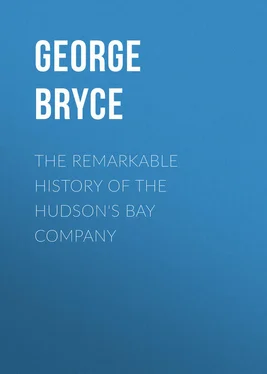George Bryce - The Remarkable History of the Hudson's Bay Company
Здесь есть возможность читать онлайн «George Bryce - The Remarkable History of the Hudson's Bay Company» — ознакомительный отрывок электронной книги совершенно бесплатно, а после прочтения отрывка купить полную версию. В некоторых случаях можно слушать аудио, скачать через торрент в формате fb2 и присутствует краткое содержание. Издательство: Иностранный паблик, Жанр: foreign_antique, foreign_prose, на английском языке. Описание произведения, (предисловие) а так же отзывы посетителей доступны на портале библиотеки ЛибКат.
- Название:The Remarkable History of the Hudson's Bay Company
- Автор:
- Издательство:Иностранный паблик
- Жанр:
- Год:неизвестен
- ISBN:нет данных
- Рейтинг книги:3 / 5. Голосов: 1
-
Избранное:Добавить в избранное
- Отзывы:
-
Ваша оценка:
- 60
- 1
- 2
- 3
- 4
- 5
The Remarkable History of the Hudson's Bay Company: краткое содержание, описание и аннотация
Предлагаем к чтению аннотацию, описание, краткое содержание или предисловие (зависит от того, что написал сам автор книги «The Remarkable History of the Hudson's Bay Company»). Если вы не нашли необходимую информацию о книге — напишите в комментариях, мы постараемся отыскать её.
The Remarkable History of the Hudson's Bay Company — читать онлайн ознакомительный отрывок
Ниже представлен текст книги, разбитый по страницам. Система сохранения места последней прочитанной страницы, позволяет с удобством читать онлайн бесплатно книгу «The Remarkable History of the Hudson's Bay Company», без необходимости каждый раз заново искать на чём Вы остановились. Поставьте закладку, и сможете в любой момент перейти на страницу, на которой закончили чтение.
Интервал:
Закладка:
For fifteen days after August 15th these wood-runners portaged over the nine or ten miles their burdens. Men carrying 150 lbs. each way have been known to make the portage and return in six hours. When the canoes were loaded at the west end of the portage with two-thirds goods and one-third provisions, then the hurry of the season came, and supplies for Lake Winnipeg, the Saskatchewan, and far distant Athabasca were hastened on apace. The difficulties of the route were at many a décharge, where only the goods needed to be removed and the canoes taken over the rapids, or at the portage, where both canoes and load were carried past dangerous falls and fierce rapids. The dash, energy, and skill that characterized these mixed companies of Scottish traders, French voyageurs, half-breed and Indian engagés , have been well spoken of by all observers, and appeal strongly to the lovers of the picturesque and heroic.
A quarter of a century after the conquest we have a note of alarm at the new competition that the Company from Hudson Bay had at last undertaken. In the Memorial before us it is stated that disturbance of trade is made by "New Adventurers." It is with a smile we read of the daring and strong-handed traders of Montreal saying, "Those adventurers (evidently H. B. Co.), consulting their own interests only, without the least regard to the management of the natives or the general welfare of the trade, soon occasioned such disorders, &c… Since that time business is carried on with great disadvantages."
This reference, so prosaically introduced, is really one of enormous moment in our story. The Frobishers, with their keen business instincts and daring plans, saw that the real stroke which would lead them on to fortune was to divert the stream of trade then going to Hudson Bay southward to Lake Superior. Accordingly, with a further aggressive movement in view, Joseph Frobisher established a post on Sturgeon Lake, an enlargement of the Saskatchewan, near the point known by the early French as Poskoiac.
A glance at the map will show how well chosen Sturgeon Lake Fort was. Northward from it a watercourse could be readily followed, by which the main line of water communication from the great northern districts to Hudson Bay could be reached and the Northern Indians be interrupted in their annual pilgrimage to the Bay. But, as we shall afterward see, the sleeping giant of the Bay had been awakened and was about to stretch forth his arms to grasp the trade of the interior with a new vigour. Two years after Frobisher had thrown down the pledge of battle, it was taken up by the arrival of Samuel Hearne, an officer of the Hudson's Bay Company, and by his founding Fort Cumberland on Sturgeon Lake, about two miles below Frobisher's Fort. Hearne returned to the Bay, leaving his new fort garrisoned by a number of Orkney men under an English officer.
During the same year an explorer, on behalf of the Hudson's Bay Company, visited Red River, but no fort was built there for some time afterward. The building of Fort Cumberland led to a consolidation on the part of the Montreal merchants. In the next year after its building, Alexander Henry, the brothers Frobisher, trader Cadot, and a daring trader named Pond, gathered at Sturgeon Lake, and laid their plans for striking a blow in retaliation, as they regarded it, for the disturbance of trade made by the Hudson's Bay Company in penetrating to the interior from the Bay.
Cadot, with four canoes, went west to the Saskatchewan; Pond, with two, to the country on Lake Dauphin; and Henry and the Frobisher brothers, with their ten canoes and upwards of forty men, hastened northward to carry out the project of turning anew the Northern Indians from their usual visit to the Bay. On the way to the Churchill River they built a fort on Beaver Lake. In the following year, a strong party went north to Churchill or English River, as Joseph Frobisher now called it. When it was reached they turned westward and ascended the Churchill, returning at Serpent's Rapid, but sending Thomas Frobisher with goods on to Lake Athabasca.
From the energy displayed, and the skill shown in seizing the main points in the country, it will be seen that the Montreal merchants were not lacking in ability to plan and decision to execute. The two great forces have now met, and for fifty years a battle royal will be fought for the rivers, rocks, and plains of the North Country. At present it is our duty to follow somewhat further the merchants of Montreal in their agencies in the North-West.
There can be no doubt that the competition between the two companies produced disorder and confusion among the Indian tribes. The Indian nature is excitable and suspicious. Rival traders for their own ends played upon the fears and cupidity alike of the simple children of the woods and prairies. They represented their opponents in both cases as unreliable and grasping, and party spirit unknown before showed itself in most violent forms. The feeling against the whites of both parties was aroused by injustices, in some cases fancied, in others real. The Assiniboines, really the northern branch of the fierce Sioux of the prairies, were first to seize the tomahawk. They attacked Poplar Fort on the Assiniboine. After some loss of life, Bruce and Boyer, who were in charge of the fort, decided to desert it. Numerous other attacks were made on the traders' forts, and it looked as if the prairies would be the scene of a general Indian war.
The only thing that seems to have prevented so dire a disaster was the appearance of what is ever a dreadful enemy to the poor Indian, the scourge of smallpox. The Assiniboines had gone on a war expedition against the Mandans of the Missouri River, and had carried back the smallpox infection which prevailed among the Mandan lodges. This disease spread over the whole country, and several bands of Indians were completely blotted out. Of one tribe of four hundred lodges, only ten persons remained; the poor survivors, in seeking succour from other bands, carried the disease with them. At the end of 1782 there were only twelve traders who had persevered in their trade on account of the discouragements, but the whole trade was for two or three seasons brought to an end by this disease.
The decimation of the tribes, the fear of infection by the traders, and the general awe cast over the country turned the thoughts of the natives away from war, and as Masson says, "the whites had thus escaped the danger which threatened them."
Two or three years after the scourge, the merchants of Montreal revived the trade, and, as we shall see, made a combination which, in the thoroughness of its discipline, the energy of its operations, the courage of its promoters, and the scope of its trade, has perhaps never been equalled in the history of trading companies.
CHAPTER XII
DISCOVERY OF THE COPPERMINE
Samuel Hearne – "The Mungo Park of Canada" – Perouse complains – The North-West Passage – Indian guides – Two failures – Third journey successful – Smokes the calumet – Discovers Arctic Ocean – Cruelty to the Eskimos – Error in latitude – Remarkable Indian woman – Capture of Prince of Wales Fort – Criticism by Umfreville.
Such an agitation as that so skilfully planned and shrewdly carried on by Arthur Dobbs, Esq., could not but affect the action of the Hudson's Bay Company. The most serious charge brought against the Company was that, while having a monopoly of the trade on Hudson Bay, it had taken no steps to penetrate the country and develop its resources. It is of course evident that the Company itself could have no reason for refusing to open up trade with the interior, for by this means it would be expanding its operations and increasing its profits. The real reason for its not doing so seems to have been the inertia, not to say fear, of Hudson's Bay Company agents on the Bay who failed to mingle with the bands of Indians in the interior.
Читать дальшеИнтервал:
Закладка:
Похожие книги на «The Remarkable History of the Hudson's Bay Company»
Представляем Вашему вниманию похожие книги на «The Remarkable History of the Hudson's Bay Company» списком для выбора. Мы отобрали схожую по названию и смыслу литературу в надежде предоставить читателям больше вариантов отыскать новые, интересные, ещё непрочитанные произведения.
Обсуждение, отзывы о книге «The Remarkable History of the Hudson's Bay Company» и просто собственные мнения читателей. Оставьте ваши комментарии, напишите, что Вы думаете о произведении, его смысле или главных героях. Укажите что конкретно понравилось, а что нет, и почему Вы так считаете.












